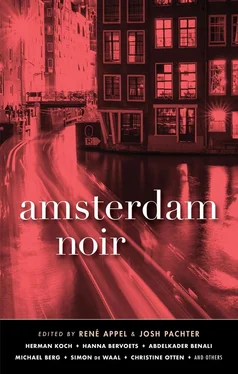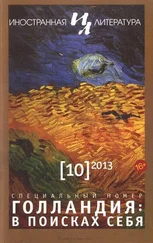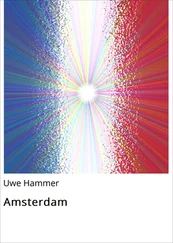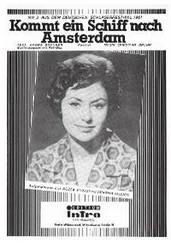Герман Кох - Amsterdam Noir
Здесь есть возможность читать онлайн «Герман Кох - Amsterdam Noir» весь текст электронной книги совершенно бесплатно (целиком полную версию без сокращений). В некоторых случаях можно слушать аудио, скачать через торрент в формате fb2 и присутствует краткое содержание. Город: New York, Год выпуска: 2018, ISBN: 2018, Издательство: Akashic Books, Жанр: Детектив, на английском языке. Описание произведения, (предисловие) а так же отзывы посетителей доступны на портале библиотеки ЛибКат.
- Название:Amsterdam Noir
- Автор:
- Издательство:Akashic Books
- Жанр:
- Год:2018
- Город:New York
- ISBN:978-1-61775-685-6
- Рейтинг книги:4 / 5. Голосов: 1
-
Избранное:Добавить в избранное
- Отзывы:
-
Ваша оценка:
- 80
- 1
- 2
- 3
- 4
- 5
Amsterdam Noir: краткое содержание, описание и аннотация
Предлагаем к чтению аннотацию, описание, краткое содержание или предисловие (зависит от того, что написал сам автор книги «Amsterdam Noir»). Если вы не нашли необходимую информацию о книге — напишите в комментариях, мы постараемся отыскать её.
Amsterdam Noir — читать онлайн бесплатно полную книгу (весь текст) целиком
Ниже представлен текст книги, разбитый по страницам. Система сохранения места последней прочитанной страницы, позволяет с удобством читать онлайн бесплатно книгу «Amsterdam Noir», без необходимости каждый раз заново искать на чём Вы остановились. Поставьте закладку, и сможете в любой момент перейти на страницу, на которой закончили чтение.
Интервал:
Закладка:
At the stationery outlet a little farther along, I bought a cardboard mailer and a big fat marker. The mailer was one of those you have to put together yourself; I stopped in a doorway on Hogeweg and folded it together, wrote her name and address in block letters on the label.
Back in my day, there wasn’t any fountain at the corner of Hogeweg and Linnaeusparkweg. On that corner, there used to be what the people called a seamy bar. Now there’s a patio restaurant where mothers sit drinking café lattes while their children shriek and splash in the fountain.
Café latte , another one of those expressions. In my day, the year I was sentenced, they were still just calling it a coffee with hot milk.
In fact, restraining orders can be a good idea. What I’m saying, I guess, is that I’m not opposed to restraining orders in principle. They can keep you safe from certain things, they can protect you from yourself, like an ignition interlock in a car. If you can’t get the car started, then you won’t hit a tree on the first curve or cream somebody at a crosswalk.
What I hadn’t counted on was that the ankle monitor would warn not only the imaginary crew of the ankle-monitor tracking room, but that it would warn me too. Halfway down Copernicusstraat, about a block and half from the crossing with Archimedesweg, it started buzzing. Not only buzzing: it actually vibrated. It went off, like an alarm clock.
“Fucking shit!” I said, and picked up the pace. Maybe they’d told me about this, maybe they hadn’t — in any case, I couldn’t remember. The deeper I went into the area covered by the restraining order, the louder the buzzing (and the vibrating). Under the trestle, it buzzed and vibrated almost nonstop.
I picked up the pace a little more; by the time I came out from under the bridge, I was sprinting. The sidewalk went up an incline there. From Google Street View, I recognized the new glass building at the corner of Archimedesweg and Carolina MacGillavrylaan. Like I said, this neighborhood hadn’t been built yet when I went into the slammer. Back then, the only thing along the Ringvaart, across from Flevopark, were some garden plots and a research lab where they did tests with radioactive material. Kids I went to grade school with used to claim they’d seen frogs with three legs and two heads along the banks of the Ringvaart. On Saturday afternoons, we combed out the whole shoreline there sometimes, but we never found a deformed frog.
There weren’t many people out on the street, fortunately. Not a lot of passersby who might hear the buzzing of my ankle monitor. That seemed pretty unlikely to me, anyway; maybe in a closed space, a room or a shop, but not here, not outside.
I was panting by the time I got to the doorway of the brown building with its two apartment towers. I scanned the nameplates beside the doorbells, waited till I’d caught my breath, then rang the one that belonged to her downstairs neighbor, on the ninth floor.
“Hello?” a woman’s voice said through the intercom, no more than ten seconds later.
“I’m your downstairs neighbor,” I said. “They left a package for you at my place this morning.”
I held up the package in front of the camera and started counting to ten; at four, there was a loud click and the glass door swung open.
As I was about to get into the elevator, a guy came through the entrance: a man in a blue windbreaker, short gray hair and glasses. It would have looked strange if I had let the elevator door close in his face.
“Good afternoon.”
“Good afternoon.”
The man pressed the button for five, I hit ten.
We started up, without another word. But there was no silence. From somewhere underneath my pant leg, at ankle height if you listened carefully, came a clearly audible, rhythmic buzzing. The man looked at me.
“My cell phone,” I said. “I’m not going to answer it now. Have to deliver this package first.”
The man nodded, but kept looking at me. Then I saw it happen in his eyes: he knew me from somewhere, though he didn’t know exactly where .
There had been a documentary about me, and the biography Marc Verhoeven was working on wasn’t the first book; there was already one about my formative years in the neighborhood, out in Watergraafsmeer, a book with way too many photos in it, from back then but also from the present.
“I live downstairs,” I said. “I’ve seen you before.”
The man got out on the fifth floor. Was I imagining it, or did he reach into his pocket as soon as he stepped out of the car? Was he maybe going for his cell phone?
Time was running out. It had been running out from the start, but now it was really running out. When I left the elevator on the tenth floor, I heard it right away, and this time I wasn’t imagining things: a police siren. Close by. At the end of the corridor I was in now, there was a little window. The flashing blue lights could be seen from all the way up here on ten.
Maybe it was a mistake, shooting myself in the foot like that by going to my ex’s place on the very first day of my leave — the best way you could think of for me to blow my chance of early parole in three years.
But the moment she opened the door — I didn’t even have to hold the package up to the glass peephole so she couldn’t see my face or my eyes, like I’d been planning — I knew it was no mistake.
I could tell from the way she looked at me; it was in her eyes. The same way those eyes had looked at me at that sidewalk café in Corleone in Sicily, where she’d been working as a waitress. That was twenty years ago. I was there on vacation, because of The Godfather . Because I wanted to visit the hometown of the Corleone family, the way someone else might go on a pilgrimage to Rome. She put a bottle of Peroni and a glass down on my table and looked at me. And I looked back.
“Rob,” her lips whispered now.
“Chiara,” I said.
“What’s...?” She pointed down at my shoes, at the buzz of my ankle monitor.
The only sound from the living room at first was that of a TV, but now there was another sound too: a man’s voice.
“Who’s there?” the voice asked, and the next moment the man appeared in the little hallway that connected the living room and the front door.
I had a feeling then that I can only describe in one way. This is it , I thought, this is what I live for . That’s what sets me apart from people like Marc Verhoeven, who will never do anything but watch from the sidelines. Like a soccer coach in the dugout: his best striker scores with an unstoppable bullet to the top corner, and all the coach can do is throw his hands in the air — all he can do is cheer.
Maybe some things had happened between me and Chiara. Technically speaking, maybe she was at that moment my ex-wife.
But I hadn’t given her up, not just like that, that’s not the way I am. Today I had come to take her back.
At what moment had Marc Verhoeven fallen into the moat? The moat that separates the visitors at the zoo from the lion’s habitat? Was it during his very first visit to the maximum-security unit? Or was it later, when he hit on the bad idea of “interviewing” my wife as well?
No, it was probably right now, I thought, as in one swift movement I tore the lid off the mailer and pulled out the brick. The brick that, in a flash of inspiration, I’d taken from the pile at the corner of Archimedesweg and Carolina MacGillavrylaan, where the road workers were putting in a new section of bike path.
This is who I am , I thought when I saw his face, his eyes those of a cow that’s grazing in the middle of the tracks and suddenly realizes there’s an express train hurtling toward it, his hands making a gesture of fending off something. More like a conciliatory gesture, really: Wait a minute, we can discuss this, right ?
Читать дальшеИнтервал:
Закладка:
Похожие книги на «Amsterdam Noir»
Представляем Вашему вниманию похожие книги на «Amsterdam Noir» списком для выбора. Мы отобрали схожую по названию и смыслу литературу в надежде предоставить читателям больше вариантов отыскать новые, интересные, ещё непрочитанные произведения.
Обсуждение, отзывы о книге «Amsterdam Noir» и просто собственные мнения читателей. Оставьте ваши комментарии, напишите, что Вы думаете о произведении, его смысле или главных героях. Укажите что конкретно понравилось, а что нет, и почему Вы так считаете.












